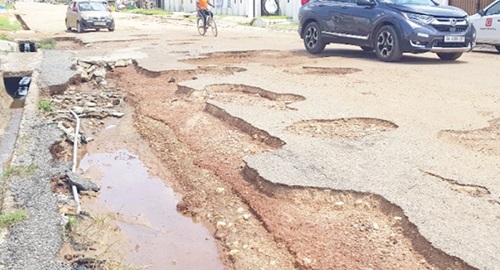
Roads, painfully distasteful parable in Ghana
Roads in Ghana tell a story of pain, anguish, corruption, wastefulness, and leadership paralysis.
Decades ago, Dr. Kwame Nkrumah, Ghana’s first President, had the foresight to link the capital, Accra, to the port city of Tema.
For him, the motorway was central to his government’s grand industrialisation plan—facilitating the import and export of goods and driving economic growth. It made perfect sense.
He was vilified for the huge expense of the project.
This road has since gone on to serve thousands of motorists and carry all kinds of goods daily to this day.
He was smart and clever enough to appreciate the fact that longevity of the road was key to the development in terms of making funds available to take care of other projects.
Pokuase Nsawam stretch
The Pokuase-Nsawam stretch has been in the news in recent times, for all the shameful reasons that make you feel sad to be Ghanaian.
This is by far the busiest road in Ghana. A road that connects the North to the South.
A road that connects the two biggest cities in Ghana, Accra and Kumasi.
Sixty-eight years after independence, various governments have shamefully failed to realise the value and the relevance of that road and have made little or no effort in dealing with that challenge.
Anyone familiar with this road over the past couple of decades would immediately notice the overwhelming volume of cars and trucks.
Common sense should have guided successive governments and planners to anticipate this natural increase and develop a long-term plan.
The expansion of the road into multiple lanes—and the financing required—ought to have been considered decades ago. Instead, many of our leaders, lacking vision, have resorted to empty rhetoric with no concrete plan to raise the necessary funds for the project.
Population growth and settlement expansion have triggered a surge in human activity and businesses along the stretch from the Ofankor Barrier to Nsawam.
That city planners failed to anticipate this trend is shockingly alarming.
Today, residents of communities along this corridor and beyond endure multiple daily challenges simply to commute to and from their destinations.
Health challenge
As a result of the stop-and-go nature of the project, motorists are forced to inhale clouds of dust, exposing them to various respiratory ailments.
Meanwhile, leaders cruising in their luxurious four-wheel drives clearly do not feel this pinch.
Having used this stretch for years, it is incongruous that so little has been done to address the situation.
The endless hours spent in traffic also cut into residents’ rest time—leaving them with little recovery after the daily hustle and bustle.
This is especially harmful to the elderly and the young. And as for workplace productivity, the less said, the better.
Financial conversation
Funds that could have supported other essential needs are now being diverted into the purchase of drugs and constant vehicle repairs.
Cars are spending more time at the mechanic’s shop than with their owners, as motorists are milked by rising maintenance costs.
Beyond this, the endless traffic on these deteriorating roads reduces the turnaround time for goods and services, inevitably driving up prices.
When trucks carrying goods between the south and the north take far longer than normal to reach their destinations, the conversation becomes inevitable: price.
Why does the state continue to pay so little attention to alternative modes of transport such as rail, water, and air?
Given the persistent ‘unavailability’ of funding for road construction, one would have thought that the country would be seriously exploring the viability of other modes of transport.
It makes little sense for a resident of Dawhenya to spend five to seven hours on the road each day just to get to work and back.
That is madness. An entire Ministry of Railways was established for eight years, supposedly to address part of this problem.
There is very little to show for all the investment that has gone into the sector.
Sadly, someone even floated the outrageous idea of building sky trains—an ill-conceived venture that led to the reckless dissipation of $2 million.
Conclusion
Without a concerted effort to address this shame, our roads will remain a constant reminder of why the country advances only arithmetically, not geometrically.
The writer is the Morning
Show Host of Class 91.3fm.
